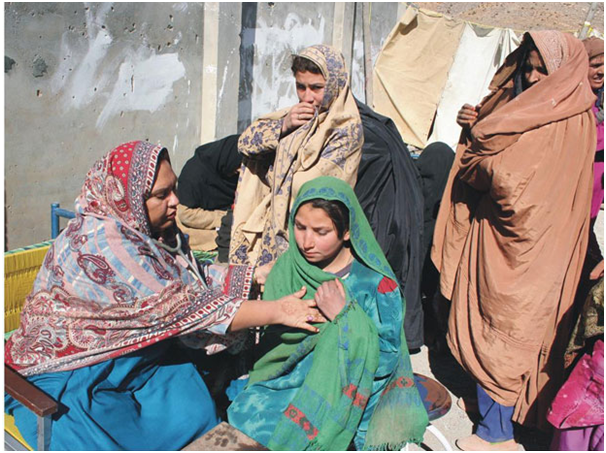Maternity Mortality New Focus For Pakistan
A pregnant woman is being examined at a local hospital in Bannu district

PESHAWAR (IPS): “We are extremely happy over the government’s initiative to give money to the pregnant women and enable them to seek proper treatment,” said Sharif Ahmed at a basic health unit (BHU), near Peshawar, the capital of Khyber Pakhtunkhwa (KP) province.
Ahmed said he had brought her his wife to undergo ultrasound and other pregnancy-related investigations at the BHU and preempt any complications.
“My wife has already experienced miscarriage of a pregnancy two years ago due to lack of lack of tests. I didn’t have money to pay for medical examinations of my wife which resulted in miscarriage,” he told IPS.
Ahmed, a wage worker, is beneficiary of the scheme launched by the provincial government to cut maternal mortality ratio (MMR) by offering the equivalent of US$ 10 to each of the pregnant women per visit to the hospital.
It is the family’s second visit to this BHU. “We have got $20 so far. The money we received has been paid on transportation charges to reach this hospital. Without this, our visit couldn’t have been possible,” he said.
The KP is one four Pakistani provinces to start such a program. The World Health Organization’s Dr Kashif Ahmed told IPS that the province has 29 per cent literacy rate, lower than rest of the country, and accordingly many people aren’t aware of pregnancy-related problems or are too shy to be seen by doctors.
Pakistan ranks third in the world with an estimated 275 out of 100,000 number of maternal deaths, behind only India and Nigeria, he said.
“At present only 50 per cent of women in the province receive any form of ante-natal care and only 25 per cent are receiving any form of post-natal care from a trained birth attendant,” he said.
The KP government hopes that the $10 payments to pregnant women for each visit to public hospitals will encourage women to undergo at least three check-ups before birth and two after birth, for which they get a total amount of $50, with the aim of reducing maternal deaths from delivery-related complications.
Another challenge is that women in this male-dominated society are also not readily coming to hospitals because they want to be seen by women doctors and there is an extreme shortage of them, as well as of nurses.
KP’s director-general for health, Dr Pervez Kamal, told IPS that the majority of the province’s 2.2 million people live in remote rural areas and thereby have difficulty in accessing primary healthcare facilities. It is hoped that providing cash payments will enable them to hire transport and reach the hospitals, he said.
“We have also put the place the services of 500 women doctors or Lady Health Workers (LHWs) in all the 1,680 rural health centres in the province to encourage the women to come there and get examined by females,” said Kamal. Thousands of LHWs have been deployed at the community level to provide vaccination besides free check-ups to the childbearing women, he said.
“As of January 2015, a total of 5,678 women have benefited from the scheme and we are hopeful that we can reduce pregnancy-related deaths in the province,” he said.
Dr Kamal said that the government has also been campaigning aggressively through radio and television advertisements to inform the people about the incentives to the pregnant mothers so more people could avail the opportunities and preempt complications.
Professor Shamim Akhtar, a gynecologist at the district headquarters hospital in Mardan, one of the KP’s 26 districts, says the government’s initiative has been been having a positive impact. “We have recorded a 50 per cent increase in visits of the pregnant women at the outpatients department of the hospital because of the money provided by the government,” she says.
The women who are getting the money and free treatment are also communicating to their relatives and neighbours about the facilities, which has resulted in people have started coming to hospitals in droves, she says.
One pregnant patient at the Mardan facility, 20-year-old Jehan Bibi, told IPS that she had been informed by a woman in her neighborhood about free treatment and money that she would get if she want to the hospital. “I have given birth to a son two years ago but I faced lot of problems because of home-based delivery. I have no money to visit the doctors then. But now the situation is different and I will get a total of $50 which is enough to visit the hospital and pay for transportation cost,” said Bibi as she underwent ultrasonography.
“During my earlier pregnancy, my family didn’t allow me to venture out of home and get examined by male doctor which caused complications. Now, my family is also happy that I am getting examination by female doctors and my in-laws have no objection,” she said.
(INTER PRESS SERVICE)



